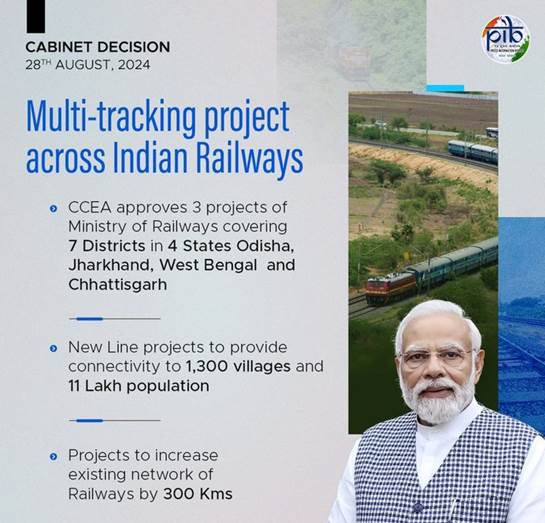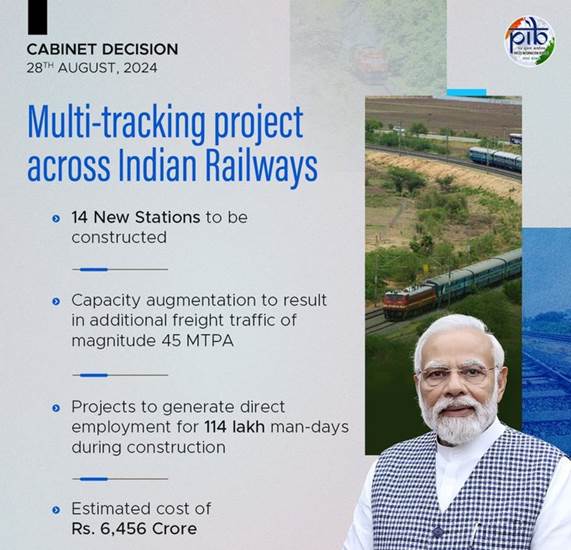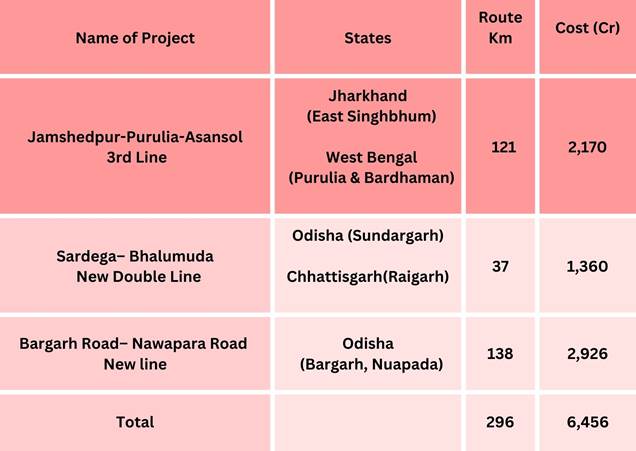Ministry of Railways
Enhancing Indian Railways: Cabinet Approves Three Railway Projects
Posted On: 29 AUG 2024 8:24PM
The Cabinet Committee on Economic Affairs (CCEA), chaired by Prime Minister Narendra Modi, has approved three significant railway projects under the Ministry of Railways, with a total estimated cost of approximately ₹6,456 crore. The projects are expected to be completed by the fiscal year 2028-29 and will create approximately 114 lakh man-days of direct employment during the construction phase. The three railway projects that have been approved are Jamshedpur- Purulia- Asansol 3rd Line, Sardega- Bhalumuda New Double Line, and Bargarh Road- Nawapara Road New Line.

The two new lines and one multi-tracking projects aim to provide direct connectivity, enhancing the mobility, efficiency, and service reliability of Indian Railways. Additionally, the multi-tracking
proposals will alleviate operational bottlenecks and reduce congestion, contributing to much-needed infrastructure development on some of the busiest railway sections across India. These initiatives align with Prime Minister Narendra Modi's vision of a ‘New India,’ empowering local populations by fostering comprehensive regional development and boosting employment and self-employment opportunities. These projects are set to enhance logistical efficiency by connecting previously unlinked regions, boosting line capacity, and improving transportation networks, which will streamline supply chains and spur economic growth.
Rooted in the PM-Gati Shakti National Master Plan for multi-modal connectivity, these projects are the result of integrated planning efforts, designed to offer seamless connectivity for the movement of people, goods, and services. The three projects span seven districts across four states- Odisha, Jharkhand, West Bengal, and Chhattisgarh and will expand the Indian Railways network by approximately 300 kilometers.

These projects will also see the construction of 14 new stations, enhancing connectivity for two aspirational districts (Nuapada and East Singhbum). The new railway lines will benefit around 1,300 villages and an estimated population of 11 lakh, while the multi-tracking project will improve connectivity for another 1,300 villages and around 19 lakh people.
These routes are crucial for transporting essential commodities such as agricultural products, fertilizers, coal, iron ore, steel, cement, and limestone. The capacity augmentation works will result in additional freight traffic of magnitude 45 MTPA (Million Tonnes Per Annum). Furthermore, the railways' environmentally friendly and energy-efficient nature will contribute to climate goals by reducing logistics costs, lowering oil imports by 10 crore liters, and cutting CO2 emissions by 240 crore kilograms, which is equivalent to planting 9.7 crore trees.

Jamshedpur- Purulia- Asansol 3rd Line (121 km; Rs. 2170 Cr)
The Jamshedpur- Purulia- Asansol 3rd Line project is a crucial enhancement to the railway network connecting West Bengal and Jharkhand, spanning 121 kilometers with an estimated cost of Rs. 2170 crore. This multi-tracking initiative will significantly improve the movement of passengers, goods, and services, ensuring smoother and more efficient transport across the region. The project strengthens connectivity between major trunk routes, notably the Delhi-Howrah and Howrah-Mumbai corridors, which will enhance the transportation of iron ore and coal to steel plants in Burnpur and Durgapur and also for the movement of finished steel products. Additionally, the project is strategically located near key tourist attractions like Maithan Dam and Churulia, as well as pilgrimage centers such as Kalyaneswari Temple and Ghagar Buri Chandi Temple. The construction of this line is expected to generate 42 lakh man-days of employment and will contribute to environmental sustainability by saving 74 crore kilograms of CO2 emissions, equivalent to planting 3 crore trees.
Sardega - Bhalumuda New Double Line (37 km; Rs. 1360 Cr)
The new double line connecting Sardega in Sundargarh district of Odisha to Bhalumuda in Raigarh district of Chhattisgarh spans 37 kilometers and comes with an estimated cost of rs. 1360 crore. This railway line will significantly benefit the large tribal population in these regions, which share strong cultural and social ties. Currently, there is no bus service between Sardega and Bhalumuda, leaving the local population dependent on private vehicles. The introduction of this railway line will greatly improve connectivity for people in the adjoining villages, facilitating easier and more reliable travel. The project is expected to generate 25 lakh man-days of employment during its construction and will contribute to environmental sustainability by saving 84 crore kilograms of CO2 emissions, equivalent to planting 3.4 crore trees.
Bargarh Road- Nawapara Road New Line (138 km; Rs. 2926 Crore)
The proposed new railway line between Bargarh Road and Nawapara Road, stretching 138 kilometers with an estimated cost of Rs. 2926 crore, will significantly enhance connectivity in two crucial districts of Odisha- Bargarh and Nuapada. This line will shorten the distance between Sambalpur and Raipur by approximately 87 kilometers, facilitating more efficient transportation. The goods shed at Padampur will be a key hub for transporting rice and bringing in cement, steel, and fertilizers, while also promoting the renowned Sambalpuri handloom textile products. Additionally, the proximity to the world-famous Nrusinghanath Temple will boost cultural and religious tourism in the area. The project is expected to generate 47 lakh man-days of employment and contribute to environmental sustainability by saving 82 crore kilograms of CO2 emissions, equivalent to planting 3.3 crore trees.
Conclusion
The approval of these three strategic railway projects by the Cabinet Committee on Economic Affairs marks a significant step toward strengthening India's transportation infrastructure. By enhancing connectivity, expanding the railway network, and reducing logistical bottlenecks, these projects will not only contribute to regional economic development but also align with India's broader goals of sustainability and self-reliance. The anticipated benefits, including substantial employment generation and environmental gains, underscore the importance of these initiatives in driving the nation's growth and ensuring a more connected and prosperous future.
References
https://pib.gov.in/PressReleasePage.aspx?PRID=2049315
https://x.com/PIB_India/status/1828743456820547838
Click here to download PDF (0.56 MB, Format: PDF)
******
Santosh Kumar/ Sarla Meena/ Aswathy Nair
(Backgrounder ID: 152068)
Visitor Counter : 458